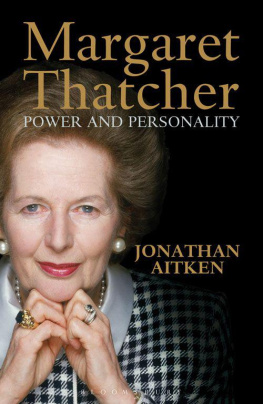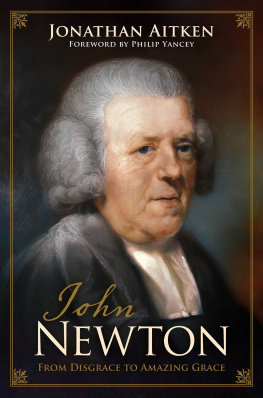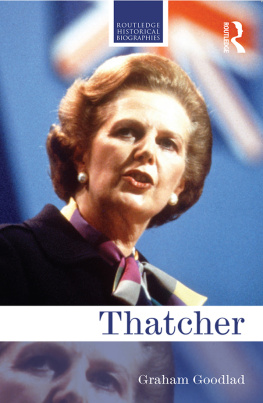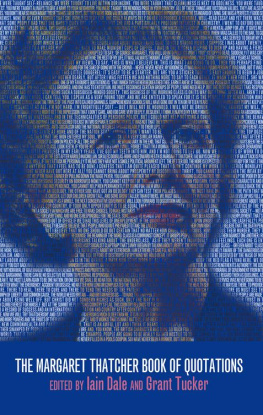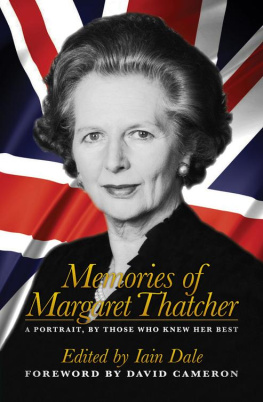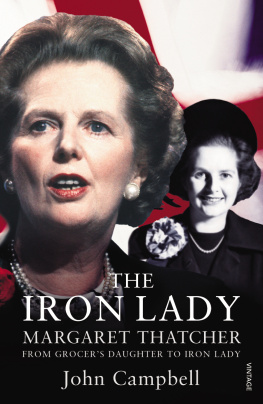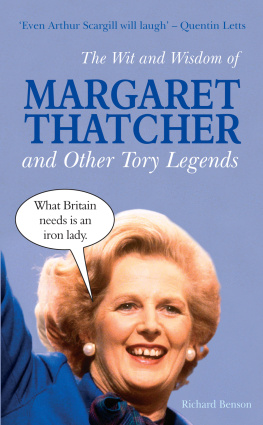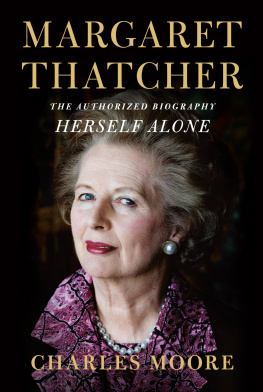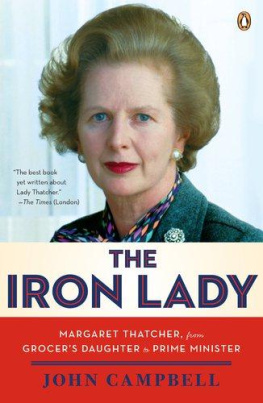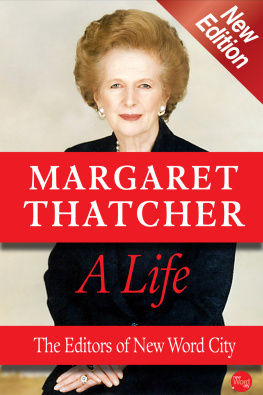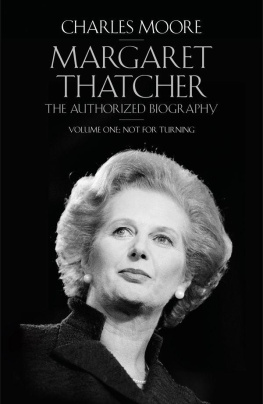MARGARET THATCHER
To Elizabeth
Contents
Between
Between
Back cover
Margaret Thatcher leaves Westminster Abbey with Jonathan Aitken after attending the memorial service for the former Speaker Selwyn Lloyd, 5 July 1978 ( Press Association )
I gratefully acknowledge all those who have helped me in the research, preparation and production of this biography of Margaret Thatcher.
There are two treasure troves of Thatcher papers to which I owe an immeasurable debt of gratitude. One is the Thatcher Archive at Churchill College, University of Cambridge. I particularly thank Dr Allen Packwood the director of the Churchill Archives Centre and the Thatcher Archivist Andrew Riley. The other and closely linked main source of papers is the Margaret Thatcher Foundation and its website. Its editor Christopher Collins and its head Julian Seymour deserve the highest praise for their vision and their industry in making such huge resources of historical material on Margaret Thatcher so easily available to scholars, students, historians and biographers.
I have trawled through several other collections of source material and would like to thank the staff of the British Library, the British Library Newspapers, the Churchill Archives Centre, the Templeman Library at the Univeristy of Kent, the Boris Johnson newspaper cuttings archive and the Hans Tasiemka Archives.
The old agricultural saying Theres no manure like the farmers foot applies to political biography. So I am immensely grateful to the many helpful guides and welcomers who showed me around places and institutions which were part of Margaret Thatchers life story.
At Grantham I would like to thank Michael and Diana Honeybone, former teacher at KGGS, who escorted me around the locations in the town, the schools and the churches which the young Margaret and the Roberts family attended. In particular I am grateful to local historian Malcolm G. Knapp and Denys Lambley of the Finkin Street Methodist Church. My thanks also go to Ian Todd, Assistant Head Teacher of Kesteven and Grantham Girls School, Mrs Janet Thompson, the Archivist, and Diane Barrett, Office Manager at the school; also to Mark Anderson, Head Teacher of Huntingtower Community Primary Academy, Grantham, and Margaret Lockwood, Office Manager. Sandra Good, the proprietor of Living Health on North Parade, kindly showed me around what used to be Roberts Food Stores on the ground floor and the flat above where the family lived, including the room where Margaret Thatcher was born.
At the University of Oxford I appreciated visiting Margaret Thatchers old room at Somerville and touring the college with the distinguished historian Dr Franklyn Prochaska, husband of the Principal Dr Alice Prochaska.
At the Royal Hospital Chelsea I was most grateful to be shown around and briefed by the Lieutenant Governor, Major General Peter Currie, and the Chaplain the Revd Dick Whittington.
The most enjoyable sources were the living witnesses to Margaret Thatchers career in public life, some ninety of whom gave me interviews. Their names are listed, with gratitude, at the end of the book.
Lastly, I must thank the many previous authors who have written books on Margaret Thatcher. Most biographers assimilate fragments, large or small, from their predecessors writings. I am no exception to this practice and I would particularly like to thank the earliest Thatcher biographers, Patricia Murray, Ernle Money, George Gardiner, Russell Lewis and Penny Junor. I also much appreciated Hugo Youngs portrait One of Us , the two-volume biography by John Campbell and the first volume of the official biography by Charles Moore published earlier this year.
Finally, the greatest thanks of all go to my own home team of researchers and secretarial helpers.
The chief researcher on my two-year biographers journey was Jacqueline Williams, whose diligence and dedication in unearthing the raw material of history was magnificent. She was ably assisted by two talented interns from Oxford University, Mark Holmes and Tom Perrin, whose enthusiasm was infectious as we read through the first draft of the manuscript and made many changes. I am also grateful to my daughter Victoria Aitken for her encouragement and occasional research.
The brunt of the typing of the manuscript was borne by the excellent Prue Fox. She was supported by Helen Kirkpatrick and Rosemary Gooding, while the onerous task of scheduling interviews and collating the draft chapters was superbly executed by Susanna Jennens.
I would also like to thank everyone concerned with this book at my publishers Bloomsbury, particularly my editor, Robin Baird-Smith, and his assistant editor, Joel Simons.
The last but really the first helper, encourager and sharer of my workload has been my beloved wife Elizabeth. She walked every step of the road of my authors journey, and the book is lovingly dedicated to her.
Jonathan Aitken
July 2013
After the applause comes the appraisal.
The applause created the most moving moment at Margaret Thatchers funeral. As her coffin was carried out of St Pauls Cathedral on the shoulders of military pallbearers while the choir sang Nunc Dimittis to the hauntingly beautiful setting of Stanford in G, the first sight of her cortge by the crowds spontaneously produced a swelling wave of sound.
It was so unexpected that those of us still seated beneath the great dome of Christopher Wrens ecclesiastical masterpiece were startled. For days the London media had been predicting hostile protests. So at this fleeting instant I and many others in the congregation wondered whether we were hearing the ultimate anti-Thatcher demonstration.
Far from it. For it quickly became clear that the great roar rolling up from Ludgate Hill and other streets near St Pauls bore the unmistakable resonance of massive cheering.
What were those crowds cheering her for? Some were too young to have known the age of Thatcher. Many more were likely to have disagreed with the values and the policies she championed. But on the day of her obsequies the overwhelming majority seemed ready to salute her lifes journey for its achievements, breakthroughs and for its footprints on the sands of time.
Applause is usually thought inappropriate at a funeral, but Margaret Thatcher broke so many conventions and ceilings in her life that the shattering of one more establishment custom in death seemed right. She would have enjoyed those cheers. Not only did they symbolise the affection of her fans; they also marked one last victory over her foes.
Because she was such a political polariser, it was anticipated that her adversaries from the militant left would turn out to give their old enemy a farewell booing. I encountered some of them on my walk towards St Pauls. These would-be troublemakers were hostile enough to give me and others attired in our tailcoats a few jeers. But a friendly apple-cheeked woman in the same part of the crowd had a different message. Dont you worry about them lot, she said in her West Country burr. Well drown them out. And they did.
The subtleties that were important elements in the make-up of Margaret Thatcher were often drowned out. She herself concealed many of them. She could be politically cautious while preferring to sound proudly radical. She had an overdeveloped sense of privacy. Throughout her life she suppressed personal information, insecurities, emotions and inconvenient truths behind a faade of carefully projected self-certainty. She became the most famous woman in the world on account of her highly visible political directness. Yet on the less visible sides of her character she could be more difficult and complicated than most people guessed.
Next page
